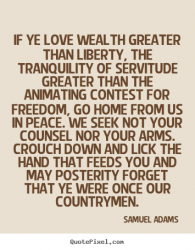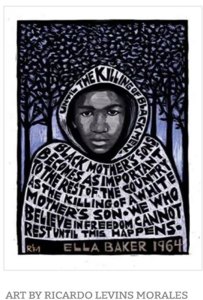Democracy Anyone? Mr. Fish: Phoning It In
Until that app is invented, I’d like to mention a few of the books that I have read that have made a deep impression on me. These are just a few of the very good books around, some by journalists, some by educators, some by activists, that offer insights into our country and world as it is today. Perhaps “knowledge is a dangerous thing” to those who wish to fill us with “miseducation” and lies. For those of us who care about democracy and yes, what was always an imperfect America, knowing that where we are now is the manifestation of years of militarism and racism is essential. Ignorance may be bliss but knowing is the first step toward change.
But there were strides brought about with the blood, sweat, and tears of many ordinary, and not so ordinary, Americans. The earlier history is documented in Howard Zinn’s A People’s History of the United States. Chapters about our time need to be added, but these authors all contribute.
The struggle continues.
Note: Descriptions under the titles in italics are from reviews, book jackets, and descriptions of each book. Those in Roman type are my own commentary.
First is the book I am currently reading, The Reporter, A Memoir, by Seymour M. Hersh, Vintage Books, Penguin Random House
This book is fascinating reading about the career of one of the most important journalists of our time. He exposed the development of chemical weapons, tracked down Wm. Calley and exposed the U.S. armies attempted cover-up of the My Lai and other massacres during the Vietnam War. He wrote stories about attempted cover-ups by the Pentagon and CIA, and more.
The book covers the beginnings of his career as a reporter to America’s “War on Terror,” including his years at The New York Times during the Vietnam War. For those of us who lived through it, it is fascinating to see what was happening in the media in this country and how much of it was born in the news and editorial rooms and from the reporters. For those for whom the Vietnam War took place long before they were born or were young children, it is a history lesson not to be missed. Hersh, along with his investigative expertise, is a suburb writer who can tell a tale, even if it’s about himself.
Another book is The Burglary, The Discovery of J. Edgar Hoover’s Secret FBI, by Betty Medsger, Vintage Books, Random House.
Another investigative reporter, Medsger has written an informative, lively, and in some ways lovely story about the Media, Pennsylvania break-in to an FBI office that was seminal in exposing a hidden war against antiwar, pro-peace activists during the Vietnam War. She covers what was happening in Washington at that time, in the government and the machinations of Hoover’s actions against activists, and Hoover’s particular targeting of people of color.
First she covers the action itself, how the activists put it together and amazedly carried it off. Woven into her story are the stories of each of the activists themselves and how they managed to “disappear” after the action, and in the final chapters, a story about each in the present and how they have lived their lives. Hoover searched for them in vain!
It is the story of what the documents they removed from the FBI office in Media PA contained, how they were gotten into the hands of reporters, and what they eventually revealed. Most sensational are investigative reports around the document stamped COINTELPRO, which resulted in the emergence of the illegal COINTELPRO program against antiwar activists, eventually addressed in Congressional hearings.
Medsger skillfully weaves the personal stories of the activists with the aftermath and importance of their famous break-in. Like the Hersh memoir, it is a fascinating slice of history. At the same time it is a heartening story of nonviolent civil disobedience, as well as an insightful history of another dark time in America and what ordinary citizens were determined to do about it.
A favorite author, Henry Giroux, America at War With Itself, City Lights Publishers
Henry A. Giroux offers a powerful, far-reaching critique of the economic interests, cultural dimensions, and political dynamics involved in the nation’s shift toward increasingly abusive forms of power. His analysis helps us to frame critical questions about what can and should be done to turn things around while we can. Some particularly memorable chapters were about Sandra Bland and Flint, Michigan.
Praise for America at War With Itself:
This is the book Americans need to read now. No one is better than Henry Giroux at analyzing the truly dangerous threats to our society. He punctures our delusions and offers us a compelling and enlightened vision of a better way. America at War with Itself is the best book of the year. “––Bob Herbert, Distinguished Senior Fellow at Demos and former Op-Ed columnist for the New York Times
“In this current era of corporate media misdirection and misinformation, America at War with Itself is a must read for all Americans, especially young people. Henry Giroux is one of the few great political voices of today, with powerful insight into the truth. Dr. Giroux is defiantly explaining, against the grain, what’s REALLY going on right now, and doing so quite undeniably. Simply put, the ideas he brings forth are a beacon that need to be seen and heard and understood in order for the world to progress.”––Julian Casablancas
Giroux is an educator and a prolific writer. His writing offers illuminating insights into our current dilemma as a nation. Two recent books include The Terror of the Unforseen and American Nightmare: Facing the Challenge of Fascism.
Here is the link to a recent article.
WE MUST OVERCOME OUR ATOMIZATION TO BEAT BACK NEOLIBERAL FASCISM By Henry A. Giroux Truthout December 6, 2019
In other words, two distinct political tremors are shaking the world: the spread of resistance to rising neo-fascism (evident in places like Brazil and the United States) on the one hand, and a new surge in massive forms of collective resistance against neoliberalism (evident in places like Chile and Colombia) on the other.
Matt Taibbi’s HATE, INC. Why Today’s Media Makes Us Despise One Another, City Lights Publishers.
A book about the corrupt mainstream corporate media and how it boondoggles us: an info-commercial highway.
“Taibbi, a writer of striking intelligence and bold ideas, is as hilarious as he is scathing.” —Publishers Weekly
FROM THE INTRODUCTION TO HATE INC.
“Now more than ever, most journalists work for giant nihilistic corporations whose editorial decisions are skewed by a toxic mix of political and financial considerations. Unless you understand how those pressures work, it’s very difficult for a casual news consumer to gain an accurate picture of the world.
This book is intended as an insider’s guide to those distortions.
“The technology underpinning the modern news business is sophisticated and works according to a two-step process. First, it creates content that reinforces your pre-existing opinions, and after analysis of your consumer habits, sends it to you.
“Then it matches you to advertisers who have a product they’re trying to sell to your demographic. This is how companies like Facebook and Google make their money: telling advertisers where their likely customers are on the web.
The news, basically, is bait to lure you in to a pen where you can be sold sneakers or bath soaps or prostatitis cures or whatever else studies say people of your age, gender, race, class, and political bent tend to buy.
Imagine your Internet surfing habit as being like walking down a street. A man shouts: “Did you hear what those damned liberals did today? Come down this alley.”
“You hate liberals, so you go down the alley. On your way to the story, there’s a storefront selling mart carts and gold investments (there’s a crash coming – this billionaire even says so!).
“Maybe you buy the gold, maybe you don’t. But at the end of the alley, there’s a red-faced screamer telling a story that may even be true, about a college in Massachusetts where administrators took down a statue of John Adams because it made a Hispanic immigrant “uncomfortable.” Boy does that make you pissed!
“They picked that story just for you to hear. It is like the parable of Kafka’s gatekeeper, guarding a door to the truth that was built just for you.
Across the street, down the MSNBC alley, there’s an opposite story, and set of storefronts, built specifically for someone else to hear.
“People need to start understanding the news not as “the news,” but as just such an individualized consumer experience – anger just for you.
This is not reporting. It’s a marketing process designed to create rhetorical addictions and shut unhelpfully non-consumerist doors in your mind. This creates more than just pockets of political rancor. It creates masses of media consumers who’ve been trained to see in only one direction, as if they had been pulled through history on a railroad track, with heads fastened in blinders, looking only one way.
“As it turns out, there is a utility in keeping us divided. As people, the more separate we are, the more politically impotent we become.
This is the second stage of the mass media deception originally described in Noam Chomsky and Edward S. Herman’s book Manufacturing Consent.
“First, we’re taught to stay within certain bounds, intellectually. Then, we’re all herded into separate demographic pens, located along different patches of real estate on the spectrum of permissible thought.
Once safely captured, we’re trained to consume the news the way sports fans do. We root for our team, and hate all the rest.
Hatred is the partner of ignorance, and we in the media have become experts in selling both.
“I looked back at thirty years of deceptive episodes – from Iraq to the financial crisis of 2008 to the 2016 election of Donald Trump – and found that we in the press have increasingly used intramural hatreds to obscure larger, more damning truths. Fake controversies of increasing absurdity have been deployed over and over to keep our audiences from seeing larger problems.
“We manufactured fake dissent, to prevent real dissent.”
Freedom Is A Constant Struggle: Ferguson, Palestine, and the Foundations of A Movement, by Angela Y. Davis, Haymarket Books
Activist, teacher, author and icon of the Black Power movement Angela Davis talks Ferguson, Palestine, and prison abolition.
In these newly collected essays, interviews, and speeches, world-renowned activist and scholar Angela Y. Davis illuminates the connections between struggles against state violence and oppression throughout history and around the world.
Reflecting on the importance of black feminism, intersectionality, and prison abolitionism for today’s struggles, Davis discusses the legacies of previous liberation struggles, from the Black Freedom Movement to the South African anti-Apartheid movement. She highlights connections and analyzes today’s struggles against state terror, from Ferguson to Palestine.
Facing a world of outrageous injustice, Davis challenges us to imagine and build the movement for human liberation. And in doing so, she reminds us that “Freedom is a constant struggle.”
Some of the ideas she discusses that resonate for me include the idea of intersectionality, the need for systemic change, and the discarding of historically obsolete language from the 20th and even the 19th centuries in our discourse about racism and by extension, into other systems in need of drastic change.
Subscribe to RiseUpTimes.org
Support independent media. Donate Now
Other books of note:
Base Nation: How U.S. Military Bases Abroad Harm America and the World, by David Vine, Metropolitan Books, Henry Holt and Company
American military bases encircle the globe. More than two decades after the end of the Cold War, the U.S. still stations its troops at nearly a thousand locations in foreign lands. These bases are usually taken for granted or overlooked entirely, a little-noticed part of the Pentagon’s vast operations. But in an eye-opening account, “Base Nation” shows that the worldwide network of bases brings with it a panoply of ills—and actually makes the nation less safe in the long run.
A reference book, with enlightening commentary about the massive network of U.S. military bases and installations worldwide and what that means for all of us locally, nationally, globally.
Wounds of War: How the VA Delivers Health, Healing, and Hope to the Nation’s Veterans (The Culture and Politics of Health Care Work) by Suzanne Gordon, Cornell University Press
US military conflicts abroad have left nine million Americans dependent on the Veterans Health Administration (VHA) for medical care. Their “wounds of war” are treated by the largest hospital system in the country—one that has come under fire from critics in the White House, on Capitol Hill, and in the nation’s media. The resulting public debate about the future of veterans’ health care has pitted VHA patients and their care-givers against politicians and policy-makers who believe that former military personnel would be better served by private health care providers.
This high stakes controversy led Suzanne Gordon, award-winning health care journalist and author, to seek insight from veterans and their families, VHA staff and administrators, advocates for veterans, and proponents of privatization. Gordon spent five years closely observing the VHA’s treatment of patients suffering from service related injuries, physical and mental.
While this book may be of particular interest to veterans and their families, it has broader ramifications for the whole health care system. I heard Gordon speak enthusiastically about the VA and state that if the U.S. has universal health care, it should be modeled on the VA system.
The VA has been a particularly controversial topic recently as privatization (use of private clinics) has emerged under the Trump administration.
Secrets: A Memoir of Vietnam and The Pentagon Papers by Daniel Ellsberg, Penguin Books
In 1971, former cold war hard-liner Daniel Ellsberg made history by releasing The Pentagon Papers, a 7,000-page top secret study of U.S. decision making in Vietnam to mainstream press across the country.
Originally published in 2002, this book has two distinct sections. Part I is background and leads up to Part II, the story of how he got the papers published. While Part I may tend to be somewhat dry, it is important historically for reference. The story of how he got Papers published, the sacrifices he made, and how it all came about, and his spectacular trial is a great story for its drama and for the courage of one man and those who helped him.
The New Jim Crow: Mass Incarceration in the Age of Colorblindness by Michelle Alexander, The New Press
Now going into its 10th anniversary edition in January, if you have not read this seminal book on today’s racism I recommend it.
Seldom does a book have the impact of Michelle Alexander’s “The New Jim Crow.” Since it was first published in 2010, it has been cited in judicial decisions and has been adopted in campus-wide and community-wide reads; it helped inspire the creation of the Marshall Project and the new $100 million Art for Justice Fund; it has been the winner of numerous prizes, including the prestigious NAACP Image Award; and it has spent nearly 250 weeks on the New York Times bestseller list.
War Is A Force That Gives Us Meaning by Chris Hedges, PubicAffairs
Published in 2002, this is the first book of Hedges that I read, although I have read many others since. Hedges was a war correspondent for the New York Times.
Drawing on his own experience and on the literature of combat from Homer to Michael Herr, Hedges shows how war seduces not just those on the front lines but entire societies—corrupting politics, destroying culture, and perverting basic human desires. Mixing hard-nosed realism with profound moral and philosophical insight, “War Is a Force that Gives Us Meaning” is a work of terrible power and redemptive clarity whose truths have never been more necessary.
All of his books have relevance to the state of the country and the world today. If I recommended one of his other books as being timely and also as an activist it would be Wages of Rebellion (Nation Books), which garnered him a Pulitzer Prize.
For Hedges, resistance is not finally defined by what we achieve, but by what we become.
+++



